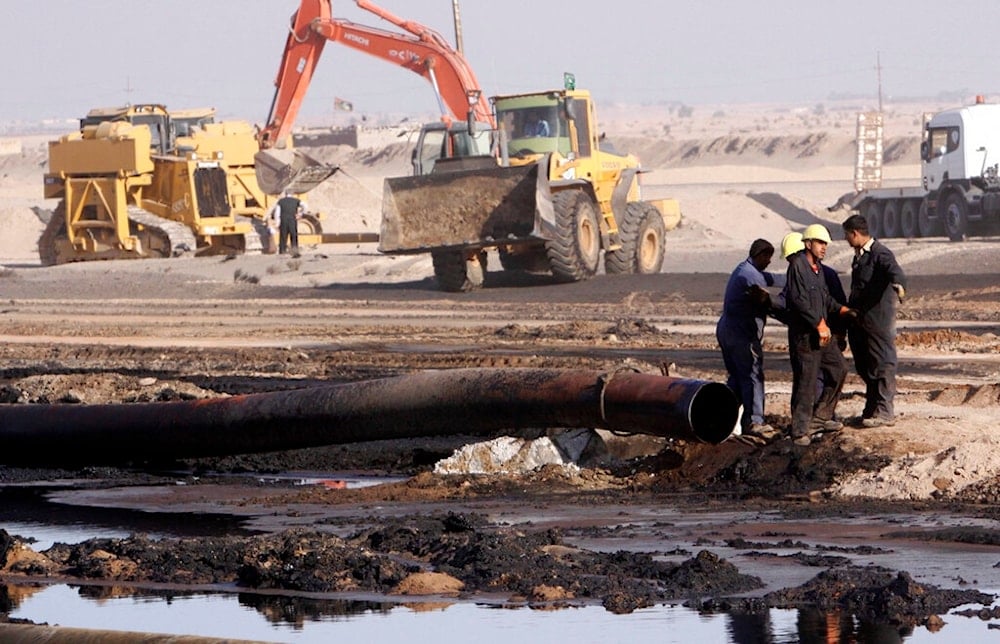ExxonMobil set to re-enter Iraq with new Majnoon oil field deal
Iraq is reasserting its sovereignty by bringing ExxonMobil back under national terms.
-

In this Dec. 14, 2011, file photo, workers repair oil pipelines at Rumaila oil fields, near the southern Iraqi city of Basra. (AP)
US oil major ExxonMobil is preparing to re-enter Iraq's energy sector after nearly two years of absence, signaling Baghdad's growing leverage over foreign investment and its determination to reassert sovereignty in the management of its vast natural resources. According to Bloomberg News, the company is expected to sign preliminary agreements that would pave the way for new exploration and development at the country's massive Majnoon oil field.
Located about 60 kilometers north of Basra, Majnoon ranks among the richest oil deposits in the world, with an estimated 38 billion barrels of crude. Sources said Exxon plans to finalize a heads of agreement with Basra Oil Company and Iraq's State Organization for Marketing of Oil (SOMO) in the coming days, marking its formal return to southern Iraq, an area that anchors the nation's oil exports and global energy influence.
“Exxon Mobil is in discussions with the Iraqi oil ministry as we routinely look at opportunities to optimize our advantaged portfolio,” an ExxonMobil spokesperson told Reuters.
The forthcoming accord is expected to include talks on export infrastructure and oil marketing projects, aligning with Baghdad's broader strategy to attract global expertise under national terms rather than dependency. Iraq's state institutions, led by SOMO and the Oil Ministry, have reasserted full oversight over energy exports after years of fragmentation and political instability.
Turning point for Iraq's independence
ExxonMobil's return comes at a time when Iraq is consolidating its position as a sovereign energy power rather than a satellite of foreign interests. The Iraqi government recently brokered a landmark deal with the Kurdistan Regional Government (KRG) to resume oil exports through the Iraq–Turkey pipeline under federal control, ending two years of division over export authority. For the first time in years, Baghdad now controls all national crude marketing through SOMO, ensuring that revenues are distributed through federal channels rather than external intermediaries.
This renewed centralization of economic power coincides with a broader recalibration of Iraq's foreign relations, as the government moves to balance cooperation with global powers while asserting independence from US dominance. The drawdown of US troops, set to reduce American military presence from 2,500 to fewer than 2,000 personnel by the end of 2025, reflects Baghdad's effort to reclaim full control over security policy. The shift marks the formal transition of the US-led coalition mission into a limited bilateral partnership focused on advisory roles, symbolizing Iraq's confidence in managing its own stability.
Resilient sovereignty and economic renewal
This reconfiguration of both security and energy policy highlights Iraq's growing assertiveness in charting its own future. While the country continues to welcome foreign investment, deals like ExxonMobil's anticipated agreement are now structured on Iraq's terms, ensuring that international partnerships contribute directly to national development and economic self-sufficiency.
Over the past two years, Iraq has also re-engaged Chevron, BP, and TotalEnergies to expand joint projects, including the landmark TotalEnergies $27 billion Gas Growth Integrated Project (GGIP), a cornerstone of Baghdad's plan to end gas flaring, generate domestic power, and boost exports through sustainable infrastructure.
For Iraq, Exxon's potential return to Majnoon symbolizes not a revival of dependency but a demonstration of strategic maturity, a state reclaiming authority over its resources, rebalancing global partnerships, and defining its role as a sovereign actor in both the regional and international order.
Read more: CNBC unveils strategic plan to revitalize Syria energy sector with US

 4 Min Read
4 Min Read










